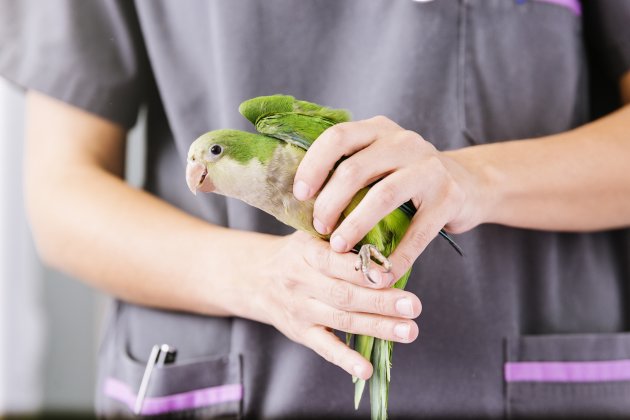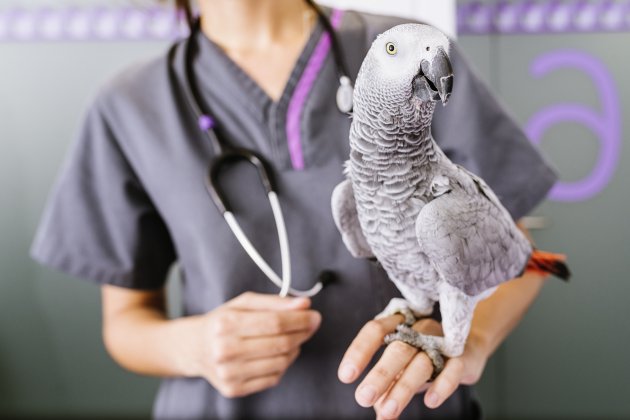Birds don’t cope well with being sick. Their body reserves are limited and their metabolism is so fast that being off color, even a short time, can quickly take a serious turn. The first step to keeping your parrot healthy is recognizing when something isn’t right.

1: Rapid Breathing
Fluffed up and breathing rapidly?
Rapid breathing can happen for a number of reasons, with the most common causes being respiratory disease. This can be due to infection from a variety of agents including bacterial, viral, or fungal.
But respiratory disease can also be caused by airway irritation (from tobacco smoke), allergy, or toxins. Examples of airborne irritants and potential toxins include household cleaners (this includes disinfectants used on cages), air fresheners, scented candles, fumes from non-stick pans, and the vapors from kerosene heaters.
Signs of respiratory disease include:
- Fluffed up feather
- Tail bobbing
- Hunched posture
- Poor appetite
- Rapid breathing
- Sneezing
- A discharge from the cere
Treatment involves keeping the parrot in a clean airspace, along with supportive care such as warmth. Depending on the cause the bird may also need medical treatment such as antibiotics or antifungals, nebulized drugs, along with tube feeding, and fluids.
2: Parrot Fever (Psittacosis)
Strictly speaking, Parrot Fever is a respiratory disease, but because it can be transmitted to people it deserves a special mention.
Parrot fever is caused by the Chlamydia family of bacteria (there are several different strains which cause subtly different symptoms.) This is a highly infectious condition. The Chlamydia are shed from the oral and respiratory secretions of birds and spread when the bird flaps their wings. It takes just 24 hours for the chlamydia to spread through the newly infected bird’s body, to shed organisms of their own in just 72 hours.
Symptoms of parrot fever in birds include:
- A dull, depressed bird
- Breathing difficulty
- A discharge from the nostrils and eyes
- Green, watery droppings
- Regurgitation and vomiting
- Tremors
- Poor appetite and weight loss
Not all birds become sick, but fight the infection and enter a ‘carrier’ state. Unfortunately, this means they pose a risk to others as they continue to excrete chlamydia and therefore contaminate the environment. Treatment requires a long course (at least 45 days) of an antibiotic called doxycycline.
3: Skin Parasites
Just as dogs can suffer from fleas, parrots are prone to number of parasites that cause itching and scratching. Indeed some of these bugs are blood suckers, and heavy infestations can cause anemia.
The most common external parasites are:
- Red Mites (Dermanyssus gallinae): These mites live in the aviary and emerge at night to suck blood
- Scaly Face and Scaly Leg Mites: These burrow into the beak and legs (respectively) to cause scaly thickening of these tissues.
- Ticks: These hide under the feathers and can be difficult to spot until engorged with blood
Depending on the particular parasite, successful treatment means medicating the bird and decontaminating the environment. An avian vet is best placed to advise you as to the products that are both effective against the parasite and safe for the bird.
4: Strange Stools
Abnormal droppings can be due to something as simple as a change of diet, right through to parasitic infections or serious organ disease.
Warning signs that something isn’t right include:
- An increase or decrease in the number of droppings
- A change in color (such as becoming green) or texture (such as being ‘bubbly’)
- Runny or more liquid droppings
- The presence of blood
If the parrot hasn’t eaten anything unusual and has strange stools, then take note. This could be a sign of infection, or perhaps even liver or kidney disease. The vet may need to investigate, of which the first step is looking at some droppings under the microscope.
Once the cause of the soft droppings is known, treatments are available.

5: Egg Binding
Female birds will sometimes produce eggs, which they have difficulty laying and become stuck in the reproductive tract.
Signs of this include:
- A distended belly
- Difficulty perching
- Tail wagging
- A paralyzed leg
Never try to free the egg yourself as this risks breaking the egg shell and causing a serious condition called egg peritonitis. Seek the help of a vet who will treat the bird with calcium, oxytocin, lubrication, and warmth so as to help the bird pass the egg naturally.
6: Psittacine Beak and Feather Disease (PBFD)
This condition is commonly the cause of birds that looked like a plucked chicken. It is caused by the circovirus and spread by virus particles in feather and skin dander.
Typically birds with PBFD have:
- Malformed feathers e.g. typically sharp or with clubbed ends
- Colored feathers lose their pigment
- Unusually short pin feathers
- The powder down feathers are lost
- Those feathers present have bloody shafts
One of the devastating things about PBFD is that there is no cure and it’s also highly infectious. Affected birds must be kept strictly quarantined to avoid spreading the condition to others. Mildly affected birds can be nursed to extend life, but those badly affected may need to be euthanized on humane grounds.
7: Stress
Parrots are flock birds that love to fly free and spend time with other birds. When kept in captivity, especially in cramped or dirty conditions, they quickly succumb to stress. This weakens their immune system making them vulnerable to secondary infections.
But happily, the responsible bird keeper can take steps to avoid stress in their birds and protect their good health. This includes:
- Researching and feeding the ideal diet for that parrot species
- Providing a cage of sufficient size for the bird to fly a few wing beats horizontally
- Keeping the cage free from droppings and in a clean airspace.
- Give the birds plenty of social interaction and play (clicker training and using puzzle feeders are simple ways to provide this)
And last, but certainly not least, plan ahead! Don’t wait for your parrot to become sick before finding a good avian vet. Research the nearest specialist vet now, while your bird is healthy, so that if the bird does sicken you can seek help quickly.